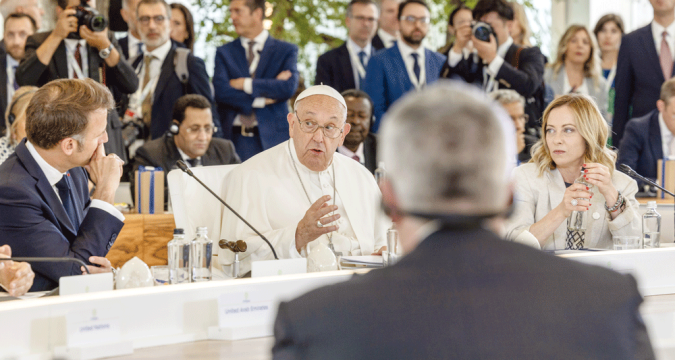
VATICAN (CNS): “We cannot allow a tool as powerful and indispensable as artificial intelligence to reinforce such a [technocratic] paradigm, but rather, we must make artificial intelligence a bulwark” against the threat, Pope Francis said in his address on June 14 at the Group of Seven [G7] summit being held in southern Italy.
The pope called artificial intelligence “an exciting and fearsome tool.” It could be used to expand access to knowledge to everyone, to advance scientific research rapidly and to give “demanding and arduous work to machines,” he said.
“Yet at the same time, it could bring with it a greater injustice between advanced and developing nations or between dominant and oppressed social classes, raising the dangerous possibility that a ‘throwaway culture’ be preferred to a ‘culture of encounter,’” the pope said.
Pope Francis pointed out that like every tool and technology “the benefits or harm it will bring will depend on its use.”
He said, “This is precisely where political action is urgently needed,” pointing out that political leaders have a responsibility to create the conditions necessary for artificial intelligence to be at the service of humanity and to help mitigate its risks.
We cannot allow a tool as powerful and indispensable as artificial intelligence to reinforce such a [technocratic] paradigm, but rather, we must make artificial intelligence a bulwark
Many people believe politics is “a distasteful word, often due to the mistakes, corruption and inefficiency of some politicians—not all of them, some. There are also attempts to discredit politics, to replace it with economics or to twist it to one ideology or another,” he said.
But the world cannot function without healthy politics, the pope said, and effective progress toward “universal fraternity and social peace” requires a sound political life.
The pope addressed leaders at the G7’s special “outreach” session dedicated to artificial intelligence. In addition to members—the United States, Japan, Canada, Germany, France, Italy and Great Britain—the forum included specially invited heads of state, including the leaders of Argentina, India and Brazil.
Because of time limits set for speakers, the pope read only a portion of his five-page speech, although the full text was made part of the official record.
While he called for the global community to find shared principles for a more ethical use of AI, Pope Francis also called for an outright ban of certain applications.
While he called for the global community to find shared principles for a more ethical use of AI, Pope Francis also called for an outright ban of certain applications
For example, the pope repeated his insistence that so-called “lethal autonomous weapons” be banned, saying “no machine should ever choose to take the life of a human being.”
Decision-making “must always be left to the human person,” he said. Human dignity itself depends on there being proper human control over the choices made by artificial intelligence programmes.
Humanity would be condemned to a future without hope “if we took away people’s ability to make decisions about themselves and their lives, by dooming them to depend on the choices of machines,” he said.
In his text, he specifically criticised judges using AI with prisoner’s personal data, such as their ethnicity, background, education, psychological assessments and credit rating, to determine whether the prisoner is likely to re-offend upon release and therefore require home-confinement.
Pope Francis also cautioned—students especially—against “generative artificial intelligence,” which are “magnificent tools” and easily make available online “applications for composing a text or producing an image on any theme or subject.”
[Generative AI] not only runs the risk of legitimising fake news and strengthening a dominant culture’s advantage, but, in short, it also undermines the educational process itself
However, the pope said, these tools are not “generative,” because they do not develop new analyses or concepts; they are merely “reinforcing” as they can only repeat what they find, giving it “an appealing form” and “without checking whether it contains errors or preconceptions.”
Generative AI “not only runs the risk of legitimising fake news and strengthening a dominant culture’s advantage, but, in short, it also undermines the educational process itself,” his text said.
“It is precisely the ethos concerning the understanding of the value and dignity of the human person that is most at risk in the implementation and development of these systems,” he told the G7 leaders. “Indeed, we must remember that no innovation is neutral.”
Technology impacts social relations in some way and represents some kind of “arrangement of power, thus enabling certain people to perform specific actions while preventing others from performing different ones,” he said. “In a more or less explicit way, this constitutive power dimension of technology always includes the worldview of those who invented and developed it.”
In order for artificial intelligence programmes to be tools that build up the good and create a better tomorrow, he said, “they must always be aimed at the good of every human being,” and they must have an ethical inspiration, underlining his support of the Rome Call for AI Ethics launched in 2020.
It is up to everyone to “make good use” of artificial intelligence, he said, “but the onus is on politics to create the conditions for such good use to be possible and fruitful.”
The 50th G7 summit was held in Borgo Egnazia in Puglia, from June 13-15 to discuss a series of global issues, including migration, climate change and development in Africa, and the situation in the Middle East and Ukraine. The pope was scheduled to meet privately with 10 heads of state and global leaders in bilateral meetings before and after his talk, including US president, Joe Biden, and Ukrainian president, Volodymyr Zelenskyy.








